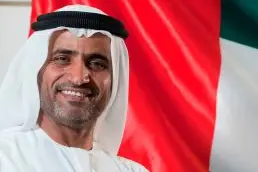PHOTO
The UAE is a global leader to endorse drone law
Dubai - The General Civil Aviation Authority (GCAA) is currently drafting the regulations and criteria for using drones in UAE skies, as well as to authorities to draft regulations parallel to those implemented by GCAA in order to control the import and distribution of these aircrafts on the local market, develop licensing criteria for the users of large-scale and advanced unmanned aerial vehicles (UAVs), and establish permissible heights and zones for flying.
In drafting the UAV regulations, the GCAA relies on the proposals of a study conducted by the National Committee, formed in October 2013, which included representatives of strategic partners and aviation service providers, in collaboration with the organizing committee of 'UAE Drones For Good Award.' The aim is to have a comprehensive study of the drone types, usage, users; as well as personal and commercial purposes of these aircrafts.
The Prime Minister's Office previously announced the 'UAE Drones For Good Award', launched by H.H. Sheikh Mohammed Bin Rashid Al Maktoum, Vice President, Prime Minister and Ruler of Dubai, as part of the 2nd Governmental Summit held last February. The award aims to use drone technology to make people's lives in the UAE or worldwide, safer and facilitate the drones technology to serve community. Another goal is to develop and establishing a legislative structure to adopt the usage of drones.
H.E. Saif Mohammed Al Suwaidi, GCAA Director General, said: "GCAA promotes modern aviation-related technologies and state-of-the-art innovations within the scope of national legislation, which ensures safe aviation."
He also stressed upon the value of collaboration with other agencies as well as the importance of issuing required licenses in accordance with applicable laws and regulations. This will reduce the unsystematic and erroneous use of drones.
He further elaborated upon promoting innovative drone use within the scope of national legislation: "As a legislative and supervisory agency of aviation safety and security in the UAE, we formed a national committee to conduct a comprehensive study to lay down detailed laws and legislation for these modern systems of drones. These will be added to the regulations currently in place, which prevent the use without prior permission from the GCAA, in coordination with the local aviation authorities."
He asserted the UAE's keenness in leading modern advances in all fields. The certification of domestic drone operation and usage of drones will have a positive impact. It will enhance the growth of the national economy and give more attention to the civil aviation sector.
The international efforts to develop a regulatory framework for the operation of drones are still immature. The UAE was among the few countries that laid a regulatory framework for this type of aircraft. The International Civil Aviation Organization (ICAO) is expected to develop international standards to regulate the activity over the coming five years.
Ismail Al Blooshi, GCAA Assistant Director General for Aviation Safety Affairs, expects a widespread use of drones in national skies in the coming period, because of the unlimited number of applications from a variety of business sectors and private companies. He added that enacting laws and regulations governing the operation of drones nationwide would pave the way to implementation by governmental entities, especially in regards to safety.
Drones are divided into three categories; low capacity drones (not exceeding 25kg in weight), mid-capacity drones (ranging from 25 kg to 150kg), and advanced capacity drones, exceeding 150kg. The licensing rules of the three categories of aircrafts will be laid down for individuals, companies, and the governmental sector.
The rules and regulations of drone use and operation will include directives prohibiting their use near airports, populated communities, and individuals as well as restricted areas. Furthermore, drones must be kept within the vision span of the user, and personal use must only be conducted at authorized facilities. Cameras and telecommunication devices are only allowed with the permission of authorized agencies.
-Ends-
© Press Release 2015




















